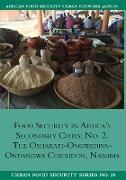- Start
- Food Security in Africa's Secondary Cities
Food Security in Africa's Secondary Cities
Angebote / Angebote:
This is the first research report to examine the nature and drivers of food insecurity in the northern Namibian towns of Oshakati, Ongwediva, and Ondangwa. As well as forming part of a new body of research on secondary urbanization and food security in Africa, the report makes systematic comparisons between the food security situation in this urban corridor and the much larger capital city of Windhoek. A major characteristic of urbanization in Namibia is the perpetuation of rural-urban linkages through informal rural-to-urban food remittances. This survey found that 55% of households in the three towns receive food from relatives in rural areas. Urban households also farm in nearby rural areas and incorporate that agricultural produce into their diets. The survey showed that over 90% of households in the three towns patronize supermarkets, which is a figure far higher than for any other food source. Overall, food security is better in Namibia's northern towns than in Windhoek, where levels of food insecurity are particularly high. However, just because the food insecurity situation is less critical in the north, the majority of households in the urban corridor are not food secure. Like Windhoek, these towns also have considerable income and food security inequality, with households in the informal settlements at greatest risk of chronic food insecurity.
Folgt in ca. 10 Arbeitstagen
